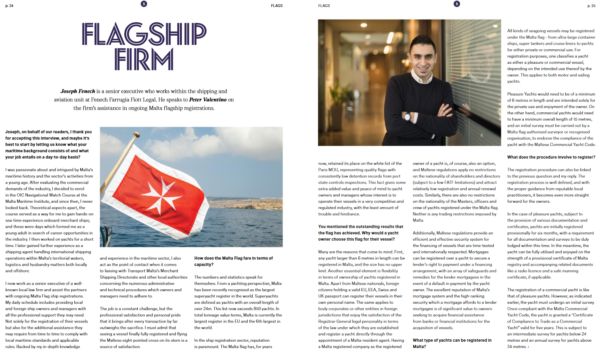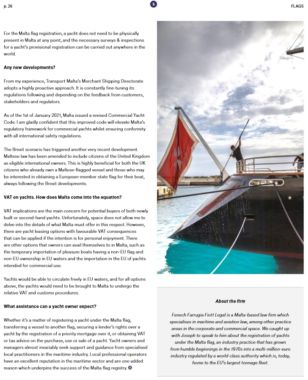Joseph Fenech, Shipping Executive within Fenech Farrugia Fiott Legal was recently interview by Skipper Magazine, an internationally renowned boats and yachting publication, in their 2021 Summer Edition.
Joseph focused on the registration process tied to Maltese-flagged ships & yachts, and on the achievements of the flag itself and some of the benefits that Malta has to offer in the yachting sector.
Joseph Fenech is a senior executive who works within the Shipping & Aviation unit of Fenech Farrugia Fiott Legal, a Malta-based law firm which specialises in maritime and aviation law among other practice areas in the corporate and commercial space. We caught up with Joseph to speak to him about the process of registration of yachts under the Malta Flag, an industry practice which has grown from humble beginnings in the 1970's into a multi-million euro industry regulated by a world-class authority which is, today, home to the EU's largest tonnage fleet.Joseph, on behalf of our readers I thank you for accepting this interview and maybe it's best to start off by letting us know what your maritime background consists of and what your job entails on a day-to-day basis?
From a young age I was passionate about and intrigued by Malta's maritime history and by the activities generated by the sector. After evaluating the commercial demands of the industry, I decided to enrol in the OIC Navigational Watch Course at the Malta Maritime Institute and since then I never looked back. Theoretical aspects apart, the course served as a way for me to gain hands-on sea-time experience onboard merchant ships; and these were days which formed me as a young adult in search of career opportunities in the industry. I then worked on yachts for a short period of time and at a later stage, I gained further experience as a shipping agent handling international shipping operations within Malta's territorial waters, logistics and husbandry matters both locally and offshore.
I now work as a senior executive of a well know local law firm and assist the partners with ongoing Malta flag ship registrations. My daily agenda includes providing local and foreign ship owners and managers with all the professional support they may need not solely for purposes of the registration of their vessels but also for the additional assistance they may need from time to time to comply with local maritime standards and applicable rules. Backed by my in-depth knowledge and past experience in the maritime sector, I also act as the point of contact when it comes to liaising with Transport Malta's Merchant Shipping Directorate and other local authorities with respect to the numerous administrative and technical procedures which owners and managers need to adhere to.
The job is a constant challenge, but the professional satisfaction and personal pride that it brings at the conclusion of every process or transaction by far outweighs the sacrifice. I must admit that seeing a vessel finally fully registered and flying the Maltese eight-pointed cross on its stern is a source of satisfaction in itself.
How does the Malta Flag fare in terms of capacity?
The numbers and statistics speak for themselves. From a yachting perspective, Malta has been recently recognised as the largest superyacht register in the world. Superyachts are defined as yachts with an overall length of over 24m. This list at the moment exceeds 850 yachts. In total tonnage value terms, Malta is currently the largest register in the EU and also the 6th largest in the world.
In the ship registration sector, reputation is paramount. The Malta flag has, for years now, retained its place on the white list of the Paris MOU, representing quality flags with consistently low detention records from port state controls inspections. This fact gives some extra added value and peace of mind to yacht owners and managers whose interest is to operate their vessels in a very competitive and regulated industry, with the least amount of trouble and hindrance.
You mentioned the outstanding results that the flag has achieved. Why would a yacht owner choose this flag for their vessels?
Many are the reasons that come to mind. First of all, any yacht larger than 6 metres in length can be registered in Malta and the size has no upper limit. Another important element is flexibility in terms of ownership of yachts registered in Malta. Apart from Maltese nationals, foreign citizens holding a valid EU, EEA, Swiss and UK passport can register their vessels in their own personal name. The same applies to body corporates or other entities in foreign jurisdictions which enjoy, to the satisfaction of the Registrar-General legal personality in terms of the law under which they are established, and which can register a yacht directly through the appointment of a Malta-resident agent. Having a Malta registered company as the registered owner of a yacht is, of course, also an option and Maltese regulations apply no restrictions on the nationality of shareholders and directors (subject to a few number of FATF limitations) and attract relatively low registration and annual renewal costs. Similarly, there are also no restrictions on the nationality of the Masters, officers and crew of yachts registered under the Malta flag. Neither are any trading restrictions imposed by Malta.
Additionally, Maltese regulations provide an efficient and effective system of security for the financing of vessels which is time-tested and internationally respected. Mortgages can be registered over a yacht to secure a lender's right to payment under a financing arrangement, with an array of safeguards and remedies for the lender mortgagees in the event of a default in payment by the yacht owner. The excellent reputation of Malta's mortgage system and the high-ranking security which a mortgage affords to a lender mortgagee is of significant value to owners seeking to acquire financial assistance from banks or financial institutions for the acquisition of vessels.
What type of yachts can be registered in Malta?
All kinds of sea going vessels may be registered under the Malta flag – from ultra large container ships, super-tankers and cruise liners to yachts for either private or commercial use. For registration purposes, one classifies a yacht as either a pleasure or commercial vessel, depending on the intended use thereof by the owner. This applies to both motor and sailing yachts.
Pleasure Yachts would need to be of a minimum of 6 metres in length and are intended solely for the private use and enjoyment of the owner. On the other hand, Commercial Yachts would need to have a minimum overall length of 15 metres and an initial survey must be carried out by a Malta flag authorised surveyor or recognised organisation, to endorse the compliance of the yacht with the Maltese Commercial Yacht Code.
What is the registration process?
Actually, the registration procedure can also be linked to the previous question and my reply. The registration process in itself is well defined and with the proper guidance from local reputable practitioners, it becomes even more straight forward for the owners.
In the case of pleasure yachts, subject to the provision of various documentation and certificates, yachts are initially registered provisionally for six months, with a requirement for all documentation and surveys to be duly lodged within this time. In the meantime, the yacht can be fully utilized and enjoyed on the strength of a provisional certificate of Malta registry, and accompanying related documents like a radio licence and a safe manning certificate, if applicable.
The registration of a commercial yacht is similar to that of pleasure yachts, however, as indicated earlier, the yacht has to undergo an Initial Survey. Once compliant, with the Malta Commercial Yacht Code, the yacht is granted a "Certificate of Compliance to Trade as a Commercial Yacht" valid for a period of five years. This is subject to an intermediate survey for yachts below 24 metres and an annual survey for yachts above 24 metres.
I would like to point out that for the purpose of the Malta flag registration, a yacht does not need to be physically present in Malta at any point and the necessary surveys & inspections for a yacht's provisional registration can be carried out anywhere in the world.
What are the latest developments?
From my experience, Transport Malta's Merchant Shipping Directorate adopts a highly proactive approach, and is constantly fine tuning its regulations following and depending on the feedback from customers, stakeholders and regulators.
As of the 1st of January 2021, Malta issued a revised Commercial Yacht Code and gladly, I am confident that this improved code will elevate Malta's regulatory framework for commercial yachts whilst ensuring conformity with all international safety regulations.
Although not yet finalized, the directorate has also embarked on a consultation process for the publication of a Passenger Yacht Code, all in the interest of regulating the constant developments in the yachting sector.
Needless to say, another very recent development has been triggered by the Brexit scenario. Maltese law has in fact been amended to include citizens of the United Kingdom as eligible International Owners. This is extremely beneficial for both the UK citizens who already own a Maltese flagged vessel but also for those who may be interested in obtaining a European-member state flag for their boat, always following the Brexit developments.
VAT on yachts. How does Malta come into the equation?
VAT implications are a main concern for potential buyers of both newly built or second hand yachts.
Unfortunately, space does not allow me to delve into the details of what Malta has to offer in this respect, however there are yacht leasing options with favourable VAT consequences which can be applied as long as the intention of use is for personal enjoyment.
There are also other options that owners can avail themselves to in Malta such as the temporary importation of pleasure boats having non-EU flag and non-EU ownership, in EU waters and the importation in the EU of yachts intended for commercial use.
Yachts would be able to circulate freely in EU waters and for all options above, the yachts would need to be brought to Malta, to undergo the relative VAT and customs procedures.
What assistance can a yacht owner expect?
Whether it's a matter of registering a yacht under the Malta flag, of transferring a yacht to another flag, of securing a lender's rights over a yacht by the registration of a first priority mortgage over it or of obtaining VAT or tax advice on the purchase, use or sale of a yacht, yacht owners and managers almost invariably seek support and advice from specialised local practitioners in the maritime industry. Local professional operators have an excellent reputation in the maritime sector and are one added reason which underpins the success of the Malta flag registry.


The content of this article is intended to provide a general guide to the subject matter. Specialist advice should be sought about your specific circumstances.

